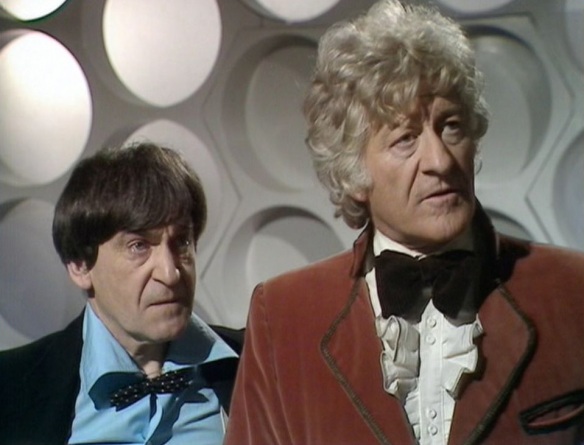
This was a nostalgic reminder of the first two years of this project, when I only had to squeeze in 25 minutes of viewing per day, and I didn’t have to write a blog post every time I watched something. I got the DVD soon after it was released, but as with Class, decided to hold off and slot it into this watch-through, which is now so near to the end.
Naturally, it was specifically reminiscent of having to fill in the blanks whilst watching reconstructions; the animation is decent, but limited enough to cause occasional distractions. Everyone’s painfully still whenever they’re not talking, the eyelines are very strange, and they walk like South Park characters. I feel like I needed little scrolling captions to tell me what the stage directions were.
But on the plus side, some of the 3D sets and the “camera” work were a lot more impressive. The direction seemed authentic to the time period, and the lighting was excellently atmospheric. They clearly prioritised the Daleks, and they looked great. Apart from anything else, they weren’t limited to only using three props and a bunch of cardboard cut outs – there were dozens more moving Daleks in this than actually existed in 1966.
As is often the case whenever an attempt is made to recreate something missing, I found myself disappointed that more care wasn’t taken to make the end product as accurate a facsimile of the original as possible. The biggest thing was that it was 16:9, which automatically means that the framing and shot composition can’t possible be identical to what viewers saw on broadcast. Opening with Hartnell’s regeneration as a pre-titles sequence is also new, as are credits for Delia Derbyshire and Raymond Cusick – deserved, but inauthentic. On that note, the double length credits sequence to accommodate the animation team got a little tedious six nights in a row.
Still, the effort to bring long lost episodes to life must be applauded and encouraged. This is a great story – though I still don’t think it’s the all-time classic it’s lauded as – and the animation allowed me to enjoy it a lot more than I did the first time round. I hadn’t noticed the humour before; Ben in particular is very good. I also hadn’t noticed that him and Polly both get a week off at various points. I enjoyed the machinations of the colonists a lot more too, and Lesterson stands out as a great guest character.
Also, I’ve just realised that Capaldi’s ring falling off Whittaker’s finger is a direct reference to the first ever regeneration, which of course makes perfect sense considering how significant a part it plays in the story. The choice to animate this particular serial ended up being surprisingly apt.
RATING: 8





 I’ve just witnessed the most depressing conclusion to a season of Doctor Who since Rose Tyler was trapped in a parallel dimension. (I know that came 40-odd years later, but time is relative.) Depressing, but utterly, utterly brilliant.
I’ve just witnessed the most depressing conclusion to a season of Doctor Who since Rose Tyler was trapped in a parallel dimension. (I know that came 40-odd years later, but time is relative.) Depressing, but utterly, utterly brilliant. I’VE DONE IT! I’VE DONE ALL THE MISSING EPISODES!
I’VE DONE IT! I’VE DONE ALL THE MISSING EPISODES! Sometimes, I get to a serial title that I recognise as being iconic, but with very little prior knowledge of what to expect. I therefore assume that it’s either notoriously good or notoriously shit. The last time that happened was
Sometimes, I get to a serial title that I recognise as being iconic, but with very little prior knowledge of what to expect. I therefore assume that it’s either notoriously good or notoriously shit. The last time that happened was  Much like
Much like  Well, that was awesome. I’d seen it once before, back when the DVD with the animated episodes first came out, but seeing it in context really emphasised the scale of this story’s ambition, in terms of plot and production values.
Well, that was awesome. I’d seen it once before, back when the DVD with the animated episodes first came out, but seeing it in context really emphasised the scale of this story’s ambition, in terms of plot and production values.